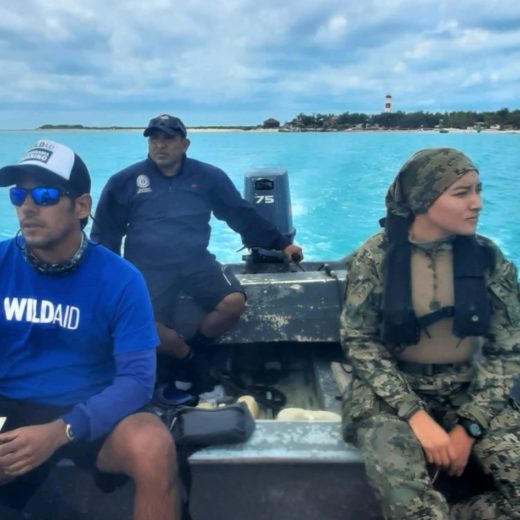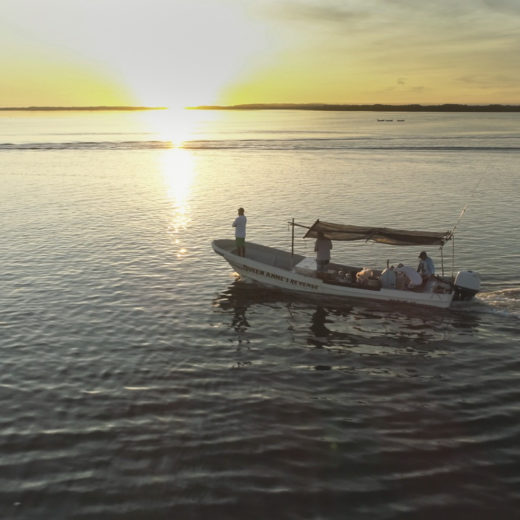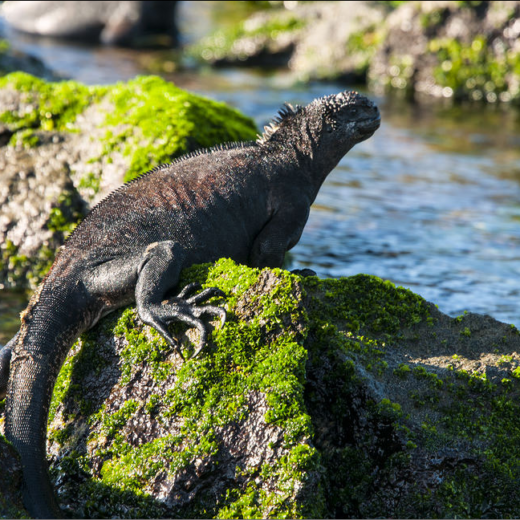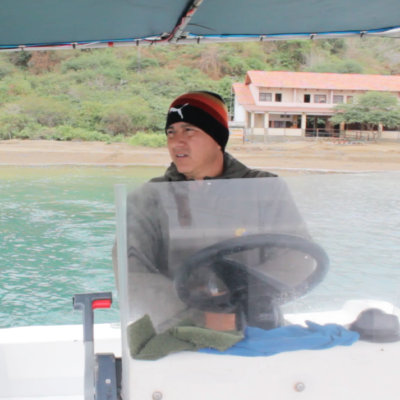
BY GUSTAVO CRESPO, WILDAID MARINE PROGRAM GUEST WRITER
It’s 7pm on a Tuesday in Puerto López, Ecuador. The Megáptera, a speedboat donated by WildAid to Machalilla National Park, lies in the sand. Two Machalilla Park Rangers, Rodrigo and Wilfer, check the tide to depart on a four-day patrol of Isla de la Plata.
“Come on!” orders Wilfred every time he thinks there’s an opportunity to push the boat into the sea. “Once the bow takes off, it’s easy,” he says. Beside him, barefoot and submerged in ankle-deep water, Rodrigo pushes when ordered. This dynamic continues until finally the boat lifts from the sand and begins to float.
Gradually the lights of Puerto Lopez begin to fade away. From the pier, a green laser points to the boat. It may just be child’s play, but the Rangers think it is likely some fishermen who observed their departure. “It would be great to leave from a different port so we could catch illegal fishers by surprise, but this is our only option,” Wilfer comments a little disappointed.
The boat picks up some speed and begins to move away from the coast. Since it’s whale season, the Rangers have to reduce their speed. It’s dark and they could crash into a humpback whale, not only injuring the animal, but also risking their own lives. In June of this year, two fishermen died when their boat, Blessing of God, hit a humpback whale.
Upon arrival to Isla de la Plata, an island known for its incredible biodiversity and abundance of species, the Rangers use night vision goggles to spot any suspicious vessels within the two-mile protected area. All seems clear, so they head to a bay on the quiet side of the island. There are fishing boats that use this area to rest.
“Good evening, gentlemen, we are Park Rangers from Machalilla National Park. Are you resting? How was your fishing?” asks Wilfer. Dark nights are the best to find fish banks, and this being a clear night, apparently meant a suboptimal catch.
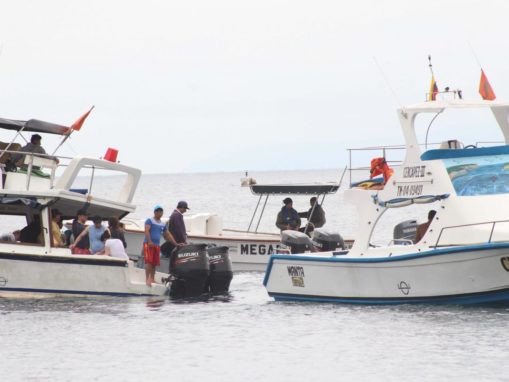

After confirming that no illegal activities were carried out, they search for a buoy designated for official Park boats. They find it occupied by a fishing boat, so they ask the fishers to station their boat at a different buoy and the fishermen comply.
Wilfer changes into more comfortable clothing to sleep, while Rodrigo lays out his sleeping bag. It is still early, so they chat as they devour the few snacks available, making plans to circle the island once more at 3am, “the silly hour” according to Wilfer, to intercept any illegal fishers.
At dawn, they embark on another patrol around the island and disembark on the beach. There is a two-story house that is used as a control and interpretation center. Tourists will arrive in a couple hours so Wilfer and Rodrigo use their time off to exercise on a pull-up bar. “It’s important to stay in shape,” Wilfer says, puffing out his chest proudly. Since they spend most of their day in a boat, exercise is very important for them.
After their workout, they eat and joke together with two colleagues that work at the center. Breakfast consists of a mountain of rice, a piece of fresh fish and a tiny portion of cooked vegetables. As one of only two meals per day, a hearty breakfast is a must.
Wilfer and Rodrigo return to the Megaptera as the morning progresses and tour boats with foreign and domestic passengers intent on bird watching, swimming with sea turtles and observing humpback whales arrive.
One of the last boats to arrive announces that they spotted a whale caught in a fishing net. Wilfer and Rodrigo, having spent all morning patrolling for illegal activities, respond and embark to the spot of the sighting. Upon arrival, they find a mother with her calf, but it is not the one they are looking for. They keep going and the sea becomes choppier.
They locate another tour boat and close by, some large splashes in the water. The foam rises several meters as an adult humpback and its young calf splash with their fins and tails, while a few photographers battle the rocking of the waves to get a shot.
The calf’s breaching tells the Rangers that this is also not the entangled whale. After some discussion, they find that this tour boat was the one that had reported the entangled whale. The crew gives a more accurate description of the situation to the Rangers.
Wilfer and Rodrigo discuss the situation and decide to cancel the search. Because it was a mild tangle, the whale will most likely be fine without a rescue. Additionally, they do not have the necessary equipment to carry out a rescue, and the boat with the equipment would take a long time to arrive. Because it is three o’clock in the afternoon and the trapped whale has not been found, they would not be able to execute the rescue before nightfall.
They abandon the search and continue their regular patrol route. In a couple hours, they will be able to rest onshore and have their second and final meal of the day. They have neither the time nor the resources for a third. Surely that meal will contain another great mountain of rice.
Español
Control y Vigilancia con los Guardaparques del Parque Nacional Machalilla
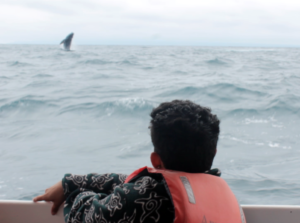

Son las 7 de la noche de un martes en Puerto López, Ecuador. La embarcación Megáptera, un pequeño bote donado por WildAid al Parque Nacional Machallilla se encuentra en la arena al pie del mar. La hora de zarpar es entre las 7 y 8 de la noche, dependiente de la marea. En la embarcación se encuentran dos Guardaparques del Parque Nacional Machalilla: Rodrigo y Wilfer. Hoy empieza su jornada de control y vigilancia que durará 4 días y se llevará a cabo alrededor de La Isla de la Plata.
“Vamos ahí!” ordena Wilfred cada vez que cree encontrar una oportunidad para empujar el bote hacia el mar. “Una vez que despegue la proa sale facilito” asegura para dar ánimos. Junto a él, con los pies descalzos y sumergidos abajo del tobillo en agua, Rodrigo empuja cuando se lo ordenan. Continúan con esta dinámica hasta que la embarcación finalmente se despega.
Poco a poco las luces de Puerto López se empiezan a alejar. Desde el muelle un láser color verde apunta a la embarcación. Puede ser simplemente un niño jugando, pero ellos creen que son los pescadores que ya saben que los van a vigilar. “Lo ideal sería salir de otro lugar para cogerlos por sorpresa. Desde otro puerto pero no se puede” menciona Wilfer algo decepcionado.
La embarcación agarra velocidad y se empieza a alejar de la costa. Ya que es temporada de ballenas no pueden ir tan rápido; está oscuro y se pueden chocar con una no solo afectando al animal, sino también a ellos mismos. En junio de este año murieron dos pescadores abordo de la embarcación pesquera “Bendición de Dios” al chocar con una ballena jorobada.
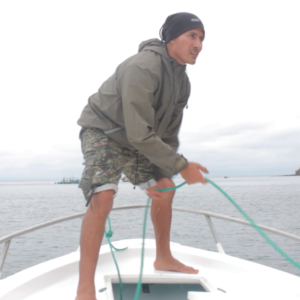

Cuando llegan a la isla empiezan el primer control. Utilizan binoculares con visión nocturna para detectar cualquier embarcación que haya invadido el área protegida de 2 millas alrededor de la isla. Sus alrededores son de los más ricos en especies en territorio ecuatoriano. Luego se dirigen a una bahía en el lado calmo de la misma. Allí también se encuentran embarcaciones de pescadores que la utilizan para descansar. Los guardaparques se acercan y realizan el control de rutina. “Buenas noches señores somos Guardaparques del Parque Nacional Machalilla. ¿Se encuentran aquí descansando? ¿Qué tal les ha ido en la pesca?” pregunta Wilfer. Al parecer no ha sido buena. Es una noche relativamente clara y esto paradójicamente perjudica la labor. Las noches oscuras son las mejores para encontrar los bancos de peces.
Luego de confirmar que no se realizaban actividades ilegales, buscan la boya designada para embarcaciones oficiales y atarse a descansar. La encuentran ocupada por una embarcación de pescadores y con autoridad les solicitan cambiarse a una boya cercana. Los pescadores acceden.
Wilfer cambia su pantalón por un calentador y se pone cómodo para dormir mientras Rodrigo hace lo mismo desarmando su sleeping bag. Como aún es algo temprano empiezan a conversar mientras devoran los pocos piqueos disponibles. A las 3 de la mañana darán una vuelta en sigilo alrededor la isla para intentar atrapar a cualquiera que no esté cumpliendo las normas. “Es la hora boba” asegura Wilfer.
Cuando amanece vuelven a realizar otra ronda de control y regresan a la bahía para desembarcar en la playa. Ahí se encuentra una casa de dos pisos que se utiliza como centro de control e interpretación. En un par de horas llegarán los turistas por lo que Wilfer y Rodrigo aprovechan su tiempo ejercitándose. Un tubo colgando entre una estructura y la pared les sirve para hacer barras. “Es importante mantenerse en forma” comenta Wilfer, inflando pecho orgulloso de su físico. Ya que pasan la mayor parte de su día en el bote, para ellos el ejercicio es muy importante.
Cuando terminan suben a desayunar. Lo hacen junto a dos compañeros. El desayuno consiste de una montaña de arroz, un pedazo de pescado fresco y una diminuta porción de vegetales cocinados.
Wilfer y Rodrigo vuelven a la embarcación mientras la mañana avanza y las embarcaciones turísticas empiezan a llegar. Vienen cargadas de turistas nacionales y extranjeros que harán avistamiento de aves desde tierra, nadarán con tortugas marinas, y principalmente observarán a las ballenas jorobadas.
Una de las últimas embarcaciones en llegar anuncia que ha divisado a un ballenato enredado en redes de pesca. La Megáptera, que se ha pasado toda la mañana realizando control y vigilancia responde y se dirige al lugar del avistamiento. Encuentran a una madre con su ballenato, pero no es el que buscaban. Siguen avanzando y el mar se vuelve más agitado.
Divisan otra embarcación de turismo y muy cerca de ella un gran alboroto en el agua. La espuma se levanta varios metros ante la actividad de una ballena jorobada adulta con su cría. Ambas saltan, chapotean con sus aletas y sus colas mientras 3 o 4 fotógrafos batallan contra el movimiento de las olas para tomar fotos.
Los saltos de la cría demuestran que este tampoco es el ballenato en problemas. Los guardaparques se acercan a la embarcación de turismo y les preguntan si lo han visto. Efectivamente, ellos fueron los que lo reportaron. Sin embargo dicen que era un enredo leve y que lo más probable es que el ballenato se desenrede solo.
Wilfer y Rodrigo analizan la situación y toman la decisión de no ejecutar una maniobra de rescate. Después de todo ellos no cuentan en ese momento con los equipos necesarios para realizarla, y la embarcación con los equipos tardaría mucho en llegar. Además son las tres de la tarde y no se ha localizado al ballenato enredado, por lo que no alcanzarían a realizar todo antes de que anochezca.
Abandonan la búsqueda y continúan con su monitoreo rutinario. Aún faltan un par de horas más antes de que puedan volver a tierra por un rato y tener su segunda y última comida del día. No tienen tiempo ni recursos para una tercera. Seguro ese plato de comida contendrá otra gran montaña de arroz.
Stay in touch and get the latest WildAid updates.
SIGN UPAbout WildAid
WildAid is a non-profit organization with a mission to protect wildlife from illegal trade and other imminent threats. While most wildlife conservation groups focus on protecting animals from poaching, WildAid primarily works to reduce global consumption of wildlife products such as elephant ivory, rhino horn and shark fin soup. With an unrivaled portfolio of celebrity ambassadors and a global network of media partners, WildAid leverages more than $308 million in annual pro-bono media support with a simple message: When the Buying Stops, the Killing Can Too.
Journalists on deadline may email communications@wildaid.org
